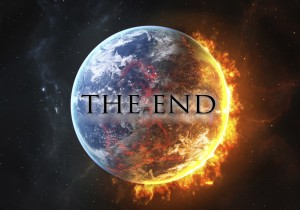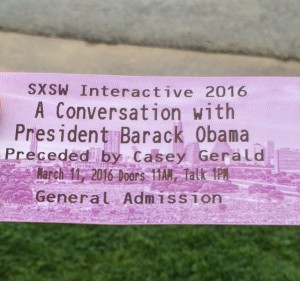On the opening day of SXSW Interactive, Casey Gerald found himself in the unenviable position of delivering a speech that was the opening act for President Obama’s keynote. No doubt, this was a prestigious position to be in, but it cannot have been easy to speak to a house packed with people who had just waited in line for hours to see someone else speak. During the Q&A that followed Gerald’s speech, his interviewer, Jeff Salamon of Texas Monthly, even made playful mention of this particular circumstance. Gerald, however, took his position in stride and delivered his rousing message with aplomb.
His speech b egan with a story, recounting his experience of New Year’s Eve 1999. He spent the holiday with a host of churchgoers who believed that the opening minute of the year 2000 was going to usher in the second coming of Christ. Obviously, this did not come to fruition and in that moment he experienced a radical shift in his being. He discovered that it was possible to not believe, to accept belief as conditional and subject to change.
egan with a story, recounting his experience of New Year’s Eve 1999. He spent the holiday with a host of churchgoers who believed that the opening minute of the year 2000 was going to usher in the second coming of Christ. Obviously, this did not come to fruition and in that moment he experienced a radical shift in his being. He discovered that it was possible to not believe, to accept belief as conditional and subject to change.
This experience was replicated years later, in the wake of his disillusionment with the position that both he and his now-disbanded organization MBAs Across America had come to occupy in many minds across the country. People had co-opted his well-documented story of finding success through adversity and made it an anecdote that justified a neoliberal rhetoric. He had become the gold standard, the go-to story that was used to tell people without boots to lift themselves up by their own bootstraps. His success was taken as license for turning a blind eye to the systemic inequalities that created the very difficulties he had overcome.
“I was the dialysis for a country that needed a kidney transplant,” he said.
Gerald’s realizations have pushed him to advocate for what he terms a Gospel of Doubt. Perhaps counterintuitively, the Gospel of Doubt hinges on a deeply held belief that things can be better. It is a gospel that looks suffering in the eye and says that there is another way. The doubt in Gerald’s gospel can be found in its attitude toward absolutism. It is a belief system that dispels the notion that the capitalist systems in place and the suffering they cause are necessary. It does away with the idea that change, if possible or necessary, will come from elite institutions that calcify and become rigid and self-sustaining.
Recently, Gerald has acted on his belief. He made the decision to close MBAs Across America, an organization he cofounded. His decision was the result of an unwillingness to allow his story and the message of his organization to become master narratives. The organization had run its course. Finding ways to use social business to make things better was its goal, and it succeeded. In the aftermath of the organization’s success, Gerald opted out of being lured to the appeal of institutional longevity. He decided to instead let the organization come to an end. Its successes, however, will live on .
.
“We have shared our staff and closed our doors,” he said. “We will share our model freely with anyone who sees their power to do this work without waiting for our permission.”
The reluctance Gerald displays to become any sort of symbol that naturalizes suffering and compels the oppressed to rise above their position is perfectly mirrored by a theme which recurred throughout his appearance. More than once, Gerald spoke of setting ego aside and being willing to become a vessel for an important message. It was seemingly in this spirit that Gerald answered an intriguing question during the Q&A session that followed his presentation. Salamon asked him what he would say to Obama if he were to have a few moments with the president before he took the stage. His answer was deeply felt and affecting, and it is an excerpt of his message with which I will draw this review to aclose:
“I’d probably say the same thing to him that I say to everybody, that I say to myself every day. I’d ask him, ‘Mr. President, what would you say if you were not afraid?’ I don’t- I’m not sure that he would necessarily say what he’s coming here to say as far as I understand it, which is in essence to sort of, you know, give a gold stamp of approval to the tech and business oligarchs of our time and ask them to save the country. You know we in this room…we represent a gospel that says that markets and technology will save us and we have a willingness to pursue that, sometimes at all costs, including the cost of millions of people who are being left behind in this country.”
Gerald’s address can be viewed here in full.
